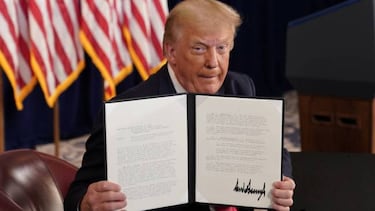Payroll tax deferral: can employers opt out?
President Donald Trump's executive order on the temporary suspension of the 6.2% tax employees contribute toward Social Security came into effect on 1 September.

Amid the impasse in Congress regarding a new coronavirus relief package, President Donald Trump moved ahead by signing a series of executive orders in early August aimed at supporting struggling Americans during the pandemic.
Among the four orders – which included a $400-a-week unemployment benefits boost, protection for evictions, and a freeze on student loan interest repayments – was a measure to implement a payroll tax deferral, which came into effect on 1 September and will last until the end of the year.
This payroll tax deferral is a temporary suspension of the 6.2% tax employees contribute toward Social Security, and it applies to individuals who earn no more than $4,000 per bi-weekly pay period.
But while the measure will bump up employees’ take-home pay until January, it is essentially a deferral meaning the money would have to be paid back next year.
Even if Trump had wanted to, he could not have signed an executive order on outright forgiveness of the tax, as this would require legislation from Congress. Though a measure on full forgiveness could eventually be passed by lawmakers.

Can employers opt out of the payroll tax deferral?
While the federal government has already decided that it will apply the tax deferral, the reception among private sector employers has been lukewarm – one main reason being the difficulty they will face explaining to workers why their paychecks are lower than usual in the New Year.
Another issue for employers is the fact that they could face tax, penalties, and interest for failing to pay any outstanding amounts by May 1, 2021.
However, employers are not obliged to defer withholding and payment of any taxes under the White House issued a Memorandum on Deferring Payroll Tax Obligations in Light of the Ongoing COVID-19 Disaster issued on August 8. As a result, many have opted out of the scheme.
- President Trump signs executive order: what is included?
- Will there be a second stimulus check?
- Nobel Peace Prize: who has nominated Trump and why?
- US elections 2020: what has Trump proposed regarding a second stimulus check?
Payroll tax deferral: Several large employers have already opted out
According to Neil Bradley of the U.S. Chamber of Commerce (via NBC Miami), most companies the chamber has spoken to are choosing not to implement the tax deferral.
Related stories
“For the simple reason that choosing to do so would leave their employees with a really hefty tax bill that would have to be collected,” Bradley explained.
Some of the nation’s largest employers have already opted out, with Forbes compiling a list of 70 such organizations, which includes General Motors, FedEx, Johnson & Johnson, UPS, Harvard University and University of Notre Dame, as well as several state and local governments such as Arizona and California.

